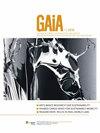关于核能可持续性的辩论:评论
IF 1.9
4区 社会学
Q4 ENVIRONMENTAL SCIENCES
引用次数: 0
摘要
核能在减少温室气体排放方面的作用在许多国家仍然是一个有争议的问题。公众辩论往往是复杂的,主要围绕着能源生产技术的价格和成本,以及它们对气候变化的影响。在这里,我们首先剖析必然会在价格-成本辩论中产生混淆的两个相互交织的因素:时间贴现和外部成本。然后,我们将探讨对风险伦理的更强烈关注如何有助于关于核能可持续性的辩论。本文章由计算机程序翻译,如有差异,请以英文原文为准。
The debate on nuclear energy for sustainability: A comment
The role of nuclear energy to cut down on greenhouse gas emissions continues to be a contentious issue in many countries. Public debate is often convoluted and largely revolves around price and costs of energy production technologies as well as their contribution to climate change. Here, we first dissect two interwoven factors bound to produce confusion in the price-cost debate: temporal discounting and external costs. We then explore how a stronger focus on risk ethics could contribute to the debate on nuclear energy for sustainability.
求助全文
通过发布文献求助,成功后即可免费获取论文全文。
去求助
来源期刊

Gaia-Ecological Perspectives for Science and Society
ENVIRONMENTAL SCIENCES-
CiteScore
2.30
自引率
18.80%
发文量
43
审稿时长
>12 weeks
期刊介绍:
GAIA is a peer-reviewed inter- and transdisciplinary journal for scientists and other interested parties concerned with the causes and analyses of environmental and sustainability problems and their solutions.
Environmental problems cannot be solved by one academic discipline. The complex natures of these problems require cooperation across disciplinary boundaries. Since 1991, GAIA has offered a well-balanced and practice-oriented forum for transdisciplinary research. GAIA offers first-hand information on state of the art environmental research and on current solutions to environmental problems. Well-known editors, advisors, and authors work to ensure the high quality of the contributions found in GAIA and a unique transdisciplinary dialogue – in a comprehensible style.
 求助内容:
求助内容: 应助结果提醒方式:
应助结果提醒方式:


